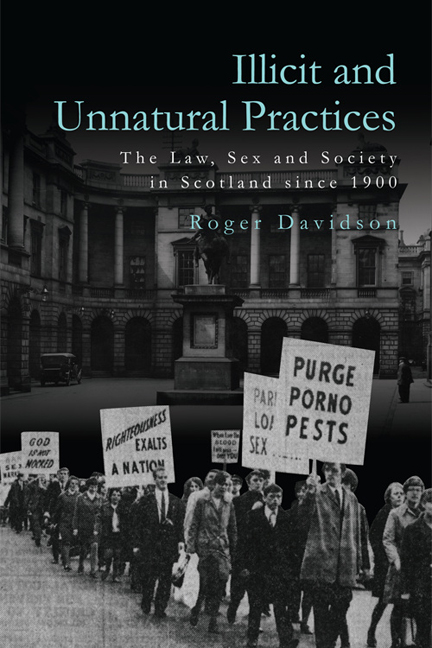Book contents
- Frontmatter
- Contents
- List of Figures and Tables
- Acknowledgements
- List of Abbreviations
- 1 Introduction
- 2 ‘Venereal Trouble’: The Case of ‘Professor’ Abraham Eastburn
- 3 ‘This Pernicious Delusion’: Law, Medicine and Child Sexual Abuse
- 4 ‘Unnatural Carnal Connection’: Bestiality and the Law in Early Twentieth-century Scotland
- 5 ‘There’s the Man who Shifts the Babies’: Abortion in the Scottish High Court, 1900−30
- 6 ‘An Open and Notorious House of Lewdness’: Dora Noyce and the Danube Street Brothel
- 7 Cure or Confinement? Law, Medicine and the Treatment of Homosexual Offenders in Scotland, 1950−80
- 8 ‘Liable or Likely to Deprave and Corrupt the Morals of the Lieges’: Sex Shops and Moral Panic in Late Twentiethcentury Scotland
- 9 ‘Culpable and Reckless Conduct’: Criminalising the Transmission of HIV in Scotland, 1983−2014
- 10 Conclusion
- Sources and Select Bibliography
- Index
2 - ‘Venereal Trouble’: The Case of ‘Professor’ Abraham Eastburn
Published online by Cambridge University Press: 23 April 2021
- Frontmatter
- Contents
- List of Figures and Tables
- Acknowledgements
- List of Abbreviations
- 1 Introduction
- 2 ‘Venereal Trouble’: The Case of ‘Professor’ Abraham Eastburn
- 3 ‘This Pernicious Delusion’: Law, Medicine and Child Sexual Abuse
- 4 ‘Unnatural Carnal Connection’: Bestiality and the Law in Early Twentieth-century Scotland
- 5 ‘There’s the Man who Shifts the Babies’: Abortion in the Scottish High Court, 1900−30
- 6 ‘An Open and Notorious House of Lewdness’: Dora Noyce and the Danube Street Brothel
- 7 Cure or Confinement? Law, Medicine and the Treatment of Homosexual Offenders in Scotland, 1950−80
- 8 ‘Liable or Likely to Deprave and Corrupt the Morals of the Lieges’: Sex Shops and Moral Panic in Late Twentiethcentury Scotland
- 9 ‘Culpable and Reckless Conduct’: Criminalising the Transmission of HIV in Scotland, 1983−2014
- 10 Conclusion
- Sources and Select Bibliography
- Index
Summary
THE CHARGE
In November 1919, self-styled ‘Professor’ Abraham Eastburn appeared before Glasgow Sheriff Court charged with contravening the Venereal Disease Act 1917 in that, ‘not being a qualified practitioner’, he had treated Richard Vincent Copley, a merchant seaman, for VD. According to Copley, he had contracted VD from a ‘prostitute’ in Montreal in 1918 and developed a ‘pain in the penis’ on the voyage home. On arriving in Glasgow in October 1918, he had sought treatment. Near Central Station he had been handed a handbill advertising Eastburn's practice and had gone to his premises in Berkeley Terrace. This appeared to be a ‘good, respectable establishment’ surrounded by other medical practices, and he assumed from the handbill and the location of the premises that Eastburn was a qualified doctor. He was duly ushered in by a caretaker and left in a waiting room that contained a book by Eastburn entitled The Citadel of Life and How to Guard It. It recounted the story of a man who had ‘let his venereal trouble go very far’. Despite complications, Eastburn had succeeded in curing him and the patient was now the proud father of a healthy boy.
Copley was then taken to the consulting room, where he was required to put down one guinea as a fee for the examination. Eastburn took a urine sample and then put something in it that ‘caused a feathery appearance’. He told Copley that he was suffering from ‘hard chancre’ and from ‘Nervousness’ and that ‘[his] nature was passing from [him] into [his] urine’. Eastburn then offered to put him through a six-months’ course of treatment for syphilis for £22 adding that, as soon as the sore was better, he would put him on a ‘combined course for Nervousness for a further £34’ lasting eight to ten months which he would allow Copley to pay by instalments. On his next visit, he was given a bottle with ‘greenish tablets’ together with a ‘small bottle of yellowish liquid’ and a ‘small camel's hair brush’. The tablets were to be taken before the three principal meals of the day and the liquid painted on the venereal sore night and morning.
- Type
- Chapter
- Information
- Illicit and Unnatural PracticesThe Law, Sex and Society in Scotland since 1900, pp. 12 - 29Publisher: Edinburgh University PressPrint publication year: 2018



